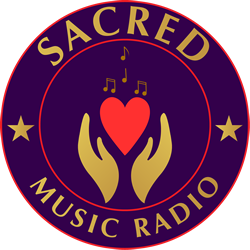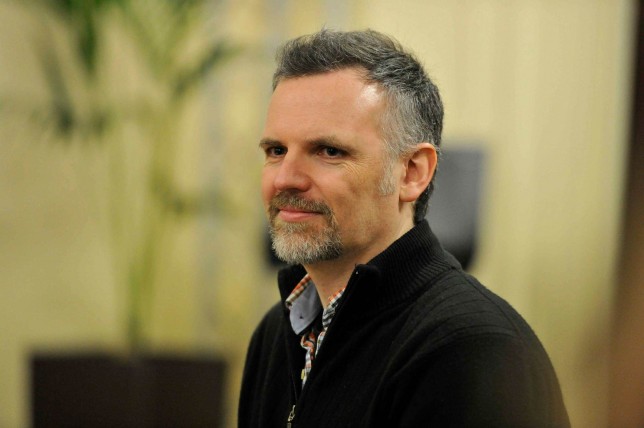Sacred Music Radio was delighted to interview the well-known composer Ciaran Hope, creator of the music for the Hollywood film “The Letters” which was based on the life of Mother Teresa of Calcutta. Ciarán spent a year working on the music, which was recorded with the Macedonian Radio Symphonic Orchestra in Mother Teresa’s hometown of Skopje Macedonia and the New Dublin Voices Choir in her spiritual birthplace of Dublin Ireland. Sony Classical released the soundtrack album in 2016.
Born and raised in Ireland, Ciaran was already reading music at the age of three before he was reading English, later studying composition at the DIT Conservatory of Music and at the Prague Conservatory before attending the UCLA film-scoring programme on a Fulbright Scholarship. Ciaran is also a graduate of BMI’s prestigious Conducting Workshop, where a select group of just eight composers out of their 400,000 are chosen to spend two weeks working intensely with a conductor and live musicians at the musicians union in Los Angeles.
His music has been the recipient of several awards such as the IMRO prize at the RTE Musician of the Future in Ireland, the International Solstice Composition Prize, a National Training Commission for Film and Television Bursary and an Arts Council of Ireland Postgraduate Award. His music was a finalist at the 2012 Park City Film Music Festival, the International Clarinet Association Composition Contest and the International Song for Peace Contest. He was a member of the orchestrating team on the score of the feature film The Insider, which was nominated for a Golden Globe Award.
Ciaran recently completed a much anticipated violin concerto for the celebrated Irish violinist Cora Venus Lunny, with the support of a prestigious Arts Council Project Bursary Award.
The music you wrote for the film The Letters has been really moving for so many people. How can you see music improving people’s lives?
Music has an amazing power over our spirit. It carries us through our darkest hours and helps us celebrate our joyous occasions. It has an amazing power to still the mind and help remove the static noise that life often inserts into our thought process. For those that perform music, the practice often elevates us to out of body experiences during performances and composers can have similar experiences while channeling ideas onto our manuscripts. This particular meditative aspect of music seriously influenced the sound of my score. I felt that Mother Teresa, this simple human being, deserved a simple score to represent her honestly. To capture this unassuming characteristic, I predominately used strings in the orchestra, with a small woodwind section and for the most part, no brass. I also chose to represent Mother Teresa’s resilient spirit with solo cello. It was interesting because musically, everything had to be extremely subtle, so as to keep the music in the correct humble yet reverend state. The result is a highly contemplative soundtrack where the spiritual suggestiveness of the music, in particular with choir and orchestra, becomes apparent.
Clearly so much of your music is what people would call sacred music. What events in your life or your background have enabled you to create such beautiful music or is it all an amazing natural ability?
I think the most significant thing driving my compositional process these days is my meditation. It was the cornerstone of my process when composing both the score and my violin concerto. I try to imagine myself as a channel for the music rather than inserting my ego as a creative intermediary. I guess the journey started in my youth, when I was raised Irish Catholic and given a deep yet gentle grounding in religion and spirituality. In school, I feel some of the priests teaching us were incredibly smart and contemplative men who started to make me think deeply about the meaning of existence. By the time I moved to California, I believe my mind was ready to take a spiritual journey. This started in earnest when I discovered Khalil Gibran’s The Prophet by accident in a St. Vincent De Paul store in downtown LA. Around the same time I took some meditation classes that explored new age concepts such as aura healings and how our spiritual energy flows in our bodies. Finally, after a lot of searching and reading I found myself involved in a contemplative meditation practice where the goal is simply to still the mind and listen to the sound of creation within us. It is with this daily practice, and though this state of being that my music is now created.
How do you see your future career progressing?
It’s very hard to see the future. I am a strong believer in fate and just work hard and let my ‘karma’ unfold.
At Sacred Music Radio we would like sacred music to become more popular. How do you think this could be achieved?
I think there is a growing awareness of sacred music. In Ireland for example, there is presently a huge resurgence in community choirs and as a result a massive amount of sacred choral music is getting performed all of a sudden. As people’s awareness grows, their desire to be further exposed to sacred or spiritually driven music is nurtured. On a personal level, I see this manifesting itself in my most performed music over the last year – my sacred choral compositions. I think as more westerners are exposed to eastern philosophies and spiritual practices, their curiosity will naturally lead them to the sacred and spiritual music that is available in the World. A sacred music radio station is a fantastic start. I wish there were more programmes on radio around the world doing what you are doing at Sacred Music Radio to be perfectly honest!
You have studied with so many amazing masters of music. Who has influenced you the most and how?
Every single composition teacher I have studied with has left his or her mark on me. My very first composition teacher was a man called Joe Groocock. A true gentleman in every sense of the word, I spent 5 years studying with Joe and during that time, his bible was Bach. His most common gentle rebuke was to ask, “Would Bach have done that?” The works of Bach were his life-long study and he was tireless in encouraging me to emulate this – Fugues and canons were regular events! I also spent 2 years studying with the wonderful Eibhlis Farrell and it was only recently when I was teaching some students about one of her choral pieces that I realized just how much her choral music had influenced mine. I hear echoes of her work in my choral writing for The Letters and I hadn’t realized just how much I had imbibed during our time together. My other major composition teacher was the Czech composer Ladislav Kubik. I spent 4 summers lugging my scores off to Prague to spend a month studying at Charles University and The Prague Conservatoire with him and he absolutely changed my life. He opened me up to the possibilities of ‘what if….”. I took off my training wheels and somehow started to let the creativity flow, and this embryonic method of writing that I began to develop turned into the meditative contemplative creative style of composing that I practice to this day. It may seem strange to cite it, but I consider my meditation teachers to have been significant influences on my compositional habits. In particular the teachings by Sant Baljit Singh of the Sant Mat meditative practice have evolved my philosophical understanding of creativity and its intertwined relationship with our spiritual development. At this point they are one in the same to me. I interpret music from the ether that I didn’t create and hope that people recognize it for what it is. It’s a very free way to create and I have felt much closer to my music since I have embraced this understanding of my process.
Sacred music from the world’s religions what effect have you seen it have on people?
I think this question is best answered from a personal experience. I recently attended a performance of my “Agnus Dei” in the Rome’s imposing Pantheon. Originally built by Marcus Agrippa in 27 BC, the venue is one of the eternal cities most ancient temples. Tears streamed from many of the singers eyes as the choir performed the piece. It stunned me to see the deep connection that the performers were experiencing with the music. I have attended several performances of the piece and another common occurrence during a performance is for the audience to get quieter and quieter until you can literally hear a pin drop. I wrote the music in such a way as to mirror my own daily decent into a deep meditative state and have been pleasantly surprised to see audiences undergo a sort of light meditative experience for themselves while experiencing a performance! For me, music is a gateway to the soul and a way for us to subtly experience the sound of the creator.



